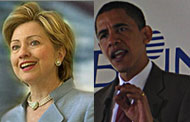Link to article here
Meanwhile, another toll tunnel in Australia financially collapses…These deals are a House of Cards and now the government wants to invest PUBLIC PENSION funds into these things. This could turn out to be an even bigger disaster than the mortgage crisis. These government brokered toll roads deals are the big dig, savings and loan, Enron, and mortgage crises on steriods!
Presidential Candidates Endorse Toll Road Bank
Democratic presidential candidates endorse $60 billion federal bureaucracy charged with funding new toll road projects.
The Newspaper.com
March 26, 2008
 Taking a page from the New Deal, Senators Hillary Clinton (D-New York) and Barack Obama (D-Illinois) have signed on to a measure that would create a public-private partnership agency tasked with expanding the role of the federal government in creating massive public works projects. As cosponsors of legislation introduced by Senator Chris Dodd (D-Connecticut), himself a former presidential candidate, the senators would create a National Infrastructure Bank to fund large federal projects with “a preference for projects which leverage private financing, including public-private partnerships.” In other words, toll roads.
Taking a page from the New Deal, Senators Hillary Clinton (D-New York) and Barack Obama (D-Illinois) have signed on to a measure that would create a public-private partnership agency tasked with expanding the role of the federal government in creating massive public works projects. As cosponsors of legislation introduced by Senator Chris Dodd (D-Connecticut), himself a former presidential candidate, the senators would create a National Infrastructure Bank to fund large federal projects with “a preference for projects which leverage private financing, including public-private partnerships.” In other words, toll roads.
By its charter, the proposed bank would administer direct subsidies and issue bonds with terms of up to fifty years to promote mass transit, public housing, toll roads and toll bridges or wastewater treatment systems. The bank would encourage local public agencies to “partner” with private for-profit entities to develop these massive projects which must be worth at least $75 million each to qualify for funding.
“The bank does not displace existing formula grants and earmarks for infrastructure,” Senator Dodd explained. “It targets specifically large capacity-building projects that are not adequately served by current financing mechanisms. The proposed Infrastructure Bank Act also will increase the ability of the private sector to play a central role in infrastructure provision.”
The idea for the bank was first proposed by the Center for Strategic and International Studies Commission on Public Infrastructure. In a 2006 report, the group cited the London Mayor Ken Livingstone’s congestion tax as a prime example of the successful execution of an infrastructure concept.
“Technology creates new opportunities for project design, capacity expansion, user cost recovery, and peak-load management,” the CSIS report explained “For example, advanced video and computer technology support congestion pricing systems that have reduced automobile traffic in London by a third.”
The US Senate Committee on Banking, Housing, and Urban Affairs held a hearing to promote the legislation on March 11. Representatives from CSIS, the American Society of Civil Engineers, Goldman Sachs and the AFL-CIO all testified in favor of the idea. A copy of the prosed legislation is available in a 90k PDF file at the source link below.
Source: S. 1926 (Congress of the United States, 8/1/2007)
loans for adverse credit tenantsaffiliate payday program loancalifornia agricultural loan hard northern money11 16 guaranteed loan payday39 payday loan 27 quickpayday quick 4 20,6 advance loandollar loan 87 billion industry studentloan abbey ukcash payday loan credit accessfax add payday website loan no


